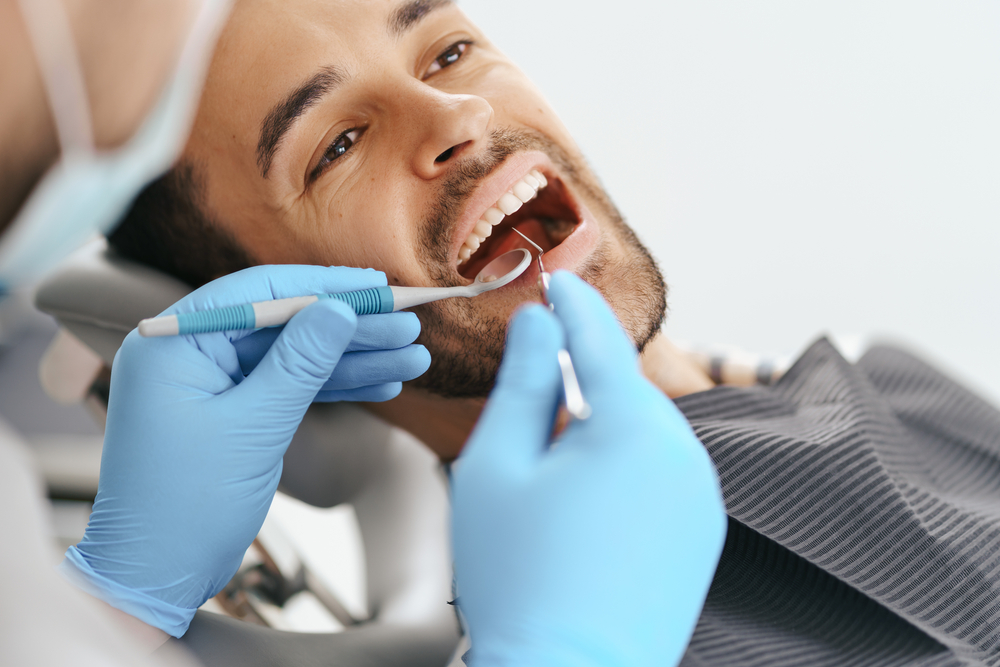Tooth Extractions in Henderson, NV
Do You Need a Tooth Extracted?
No one wants to hear that they need a tooth extracted, but sometimes, it’s best for oral health. Our Henderson, NV dentists led by Dr. Leeor Dadon-Harris provide reliable and safe tooth extractions to ensure our patients get the best care possible.
To schedule an appointment, contact Green Valley Dental Center by calling (702) 896-8933.
What Is Tooth Extraction?
 Tooth extraction is a routine dental procedure that involves removing a tooth or multiple teeth from its socket. This removal can be necessary for several reasons, including severe tooth decay or damage, crowding, infection, or problems with wisdom teeth. Tooth extraction is a common form of oral surgery.
Tooth extraction is a routine dental procedure that involves removing a tooth or multiple teeth from its socket. This removal can be necessary for several reasons, including severe tooth decay or damage, crowding, infection, or problems with wisdom teeth. Tooth extraction is a common form of oral surgery.
Our Henderson, NV dentist prioritizes keeping your natural teeth healthy. However, there are some cases in which removing a tooth through extraction is best for protecting your overall wellness.
Types of Tooth Extraction
Simple Tooth Extraction
Simple tooth extraction is a dental procedure that involves removing a tooth visible above the gum line. This procedure is usually performed with a local anesthetic, and the dentist uses special tools to loosen the tooth and remove it with forceps. Simple tooth extraction is a relatively quick and straightforward procedure, and the recovery time is fairly short for most patients.
Surgical Tooth Extraction
Surgical tooth extraction is a more complex procedure necessary when a tooth is either impacted or hasn’t fully emerged from the gum line. Oral surgeons often perform surgical tooth extractions, especially for impacted teeth. A surgical extraction may require local anesthetic, and the dentist may need to make an incision in the gum tissue to access the tooth.
In some cases, the dentist may need to remove some bone tissue to fully extract the tooth. The recovery time for surgical tooth extraction can take anywhere from a few days to a few weeks depending on the person. The patient may need to take prescription pain medication to manage any discomfort.
Reasons For Tooth Extraction
Tooth extraction may be a preventative measure to avoid potential dental problems in the future. Common reasons dentists perform tooth extractions include:
- Tooth Decay: If a tooth has extensive decay that a filling, root canal, or other treatment can’t repair, extraction may prevent further damage to surrounding teeth and tissues.
- Gum Disease: Advanced periodontal disease can cause the gums to recede and the teeth to loosen, making extraction necessary to prevent further damage.
- Impacted Teeth: Teeth unable to fully emerge from the gums, such as wisdom teeth, can become impacted and cause pain, infection, and damage to surrounding teeth.
- Crowding: Tooth extraction can make room for orthodontic treatment or address issues with overcrowding.
- Trauma: A tooth may need extraction following damage from a traumatic injury.
- Infection: If a tooth becomes infected and it spreads to the surrounding tissues or bone, extraction may be necessary to prevent further damage.
- Preparation for Dentures: If a patient needs dentures, extraction may be necessary to remove any remaining natural teeth that could interfere with the fit and comfort of the dentures.
 The Tooth Extraction Process
The Tooth Extraction Process
The tooth extraction process begins with a thorough examination of the affected tooth and surrounding tissues. Often, patients will need X-rays taken so the dentist can assess the tooth’s position and extent of any damage or decay. Once prepared, the dentist or oral surgeon administers local anesthesia to numb the area around the tooth. If the tooth is impacted or difficult to remove, an incision may be made in the gum tissue to access the tooth.
Next, Dr. Dadon-Harris will use specialized tools to loosen the tooth from the socket and carefully remove it. Occasionally, the tooth may need to be broken into smaller pieces to make it easier to remove.
After our dentist has extracted the tooth, the dentist or oral surgeon cleans the area and may place stitches to help the gums heal. The patient will receive instructions on caring for the extraction site, including avoiding certain foods and activities for a while.
Tooth Extraction Aftercare: Ensuring a Proper Blood Clot
After tooth extraction, following proper aftercare instructions is vital to promote healing and prevent complications. Here are some general guidelines for tooth extraction aftercare:
- Bite Down on a Gauze Pad: Bite gently on a gauze pad for 30 to 45 minutes after the extraction to help stop bleeding. Replace the gauze as needed.
- Avoid Strenuous Activities: Avoid strenuous activities, such as exercise, for at least 24 hours after the extraction to help prevent bleeding or other complications from occurring.
- Take Pain Relievers: Take pain relievers as prescribed by your dentist or oral surgeon to help manage any pain, discomfort, and swelling.
- Apply Ice: Ice the affected area for 10 to 20 minutes at a time to help reduce swelling.
- Rest: Rest for the first 24 hours after the extraction and avoid any activities that could dislodge the blood clot from the tooth socket.
- Avoid Smoking: Avoid smoking or using tobacco products for at least 48 hours after the extraction, as they can slow the healing process.
- Eat Soft Foods: Eat soft foods, such as soup, yogurt, or mashed potatoes, for the first few days after the extraction. Avoid hard, crunchy, or sticky foods that could irritate the extraction site.
- Rinse With Salt Water: Rinse your mouth with salt water (1/2 teaspoon of salt in 8 ounces of warm water) 24 hours after the extraction and continue two to three times a day for the next few days. This rinse can promote healing and reduce the risk of infection.
- Brush Carefully: Brush your teeth carefully, avoiding the extraction site, for the first few days after the extraction.
- Attend Follow-Up Appointments: Attend follow-up appointments with your dentist or oral surgeon to ensure proper healing and monitor for complications.
Risks and Complications of Tooth Extraction
While tooth extractions are generally safe and routine procedures, there are potential risks and complications to keep in mind. These may include:
- Bleeding
- Infection
- Nerve damage
- Dry socket (a painful condition that can occur when the blood clot in the socket is dislodged)
- Damage to surrounding teeth or tissues
- Reactions to anesthetic
Discuss any concerns with our Henderson, NV dentist before the procedure, and carefully follow aftercare instructions to help minimize your risk of complications after getting a tooth pulled.
Tooth Extraction Cost
On average, tooth extraction costs can range from $120 to $250 for a basic extraction. However, for those getting their wisdom teeth extracted, costs can range between $1,000 to $3,000 per tooth. Your total estimated cost will vary depending on factors such as:
- Type of extraction
- Where you’re located
- Dental insurance plan
- Additional procedures
- The experience of your dentist or oral surgeon
- Number of teeth being extracted
Why Choose Our Henderson Dental Office for Tooth Extraction by an Oral Surgeon?
Our team is dedicated to making the process as comfortable and compassionate as possible while ensuring the best possible outcome for your oral health. Here’s why Green Valley Dental Center is the perfect choice for your tooth extraction needs:
- Experienced and Gentle Dentists: Our dentists are highly skilled and experienced in tooth extraction procedures. They prioritize gentle techniques and patient comfort throughout the process.
- Pain Management Options: We offer various pain management options to ensure your comfort during the procedure. We’ll discuss your needs and preferences to choose the most suitable pain management technique.
- Oral Surgeons for Complex Extractions: Our team includes oral surgeons who are experts in performing complicated and surgical extractions. They provide general anesthesia options for patients with dental anxiety or for more difficult procedures.
- Advanced Technology: We utilize advanced dental technology, including digital X-rays and 3D imaging, to ensure precise planning and minimally invasive procedures whenever possible.
Frequently Asked Questions
The duration of recovery after getting a tooth pulled varies based on individual healing capacities. Generally, it takes about one to two weeks to recover fully. Initial healing occurs within the first few days.
No, tooth extraction isn’t painful. When performed by a skilled dentist or oral surgeon using appropriate local anesthetic or sedation, this dental procedure typically involves minimal discomfort during the procedure. Post-extraction, some discomfort or mild pain is normal, which can be managed effectively with prescribed medications.
Insurance coverage for tooth removal largely depends on the specifics of your insurance plan. In most cases, dental insurance covers a portion of tooth extraction costs, but the extent of coverage can vary. Consult your insurance provider to understand the coverage details related to tooth removal.
The ideal age for wisdom tooth extraction varies for each individual. Generally, it’s recommended to consider extraction during the late teenage years or early twenties when the wisdom teeth roots are not fully developed. This age range often facilitates easier extraction and quicker recovery.
Find Relief From Tooth Infection and Pain with Gentle Extractions
For persistent toothaches and overcrowded or damaged teeth, seeking professional dental care is imperative. Dr. Dadon-Harris and our team at Green Valley Dental Center offer stress-free dental extraction services. To schedule an appointment, contact our Henderson office at (702) 896-8933. We warmly welcome patients from Spring Valley, Winchester, and Paradise, NV.
